On November 15, 2016, Daiichi Sankyo representatives visited the community center of Mabi Village in the township of Zhetu of Guangnan County in the Yunnan province of China in order to observe the progress of the mother and child healthcare improvement project conducted in this area, which is now in its second year. The community center is meant to serve as a venue for mutual learning by helping collect and share information regarding mother and child health and nutrition management. A total of six such community centers have been established in areas targeted by this project, and these facilities are staffed by local volunteers and healthcare professionals (village doctors).
After a two-hour car ride from central Guangnan, Mabi Village came into view.
Community Center Visit
The Mabi community center opens twice a week to provide healthcare education to parents.
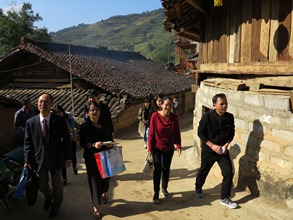
We walked up the slope to the village’s community center.
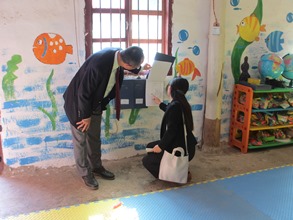
The community center was established in a closed elementary school.
Healthcare Education Provided to Parents by Village Doctors
Lectures were held on topics such as guidelines for giving baby food and nutritional supplements to infants, traditional pressure point treatment methods, and means of addressing children’s injuries.
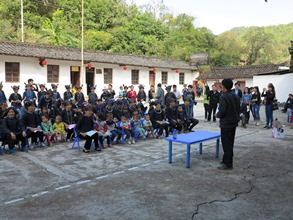
Many parents gathered for the village doctor’s lecture.
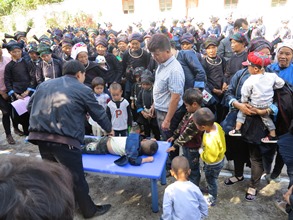
Pressure point treatment methods were demonstrated on a child.
Interview with Local Volunteers
We exchanged information with the local volunteers that play a crucial role in this project.
The lead volunteer spoke of how much new knowledge they had gained through volunteer training and how they now want to share this healthcare knowledge with other village residents.
Visit to Local Healthcare Office
After the leaving the community center, the Daiichi Sankyo representatives visited a healthcare office in a neighboring village. The healthcare office was essentially a village clinic, conducting outpatient care, simple medical procedures, postnatal healthcare management for mothers and children, and pharmaceutical management. This office is currently operated by two village doctors. These doctors also visit nearby elementary schools on a monthly basis to conduct healthcare classes.
The healthcare office’s village doctors told us that the Integrated Management of Childhood Illness (IMCI) strategy training sessions held as part of the project were good opportunities to learn about antibiotic usage and other subjects that are of use in making diagnoses.
Discussion with Guangnan County Health Bureau and Women’s Federation
The Guangnan County Health Bureau and Women’s Federation help in conducting IMCI strategy training sessions, operating community centers, and supporting volunteers. We held a discussion with representatives from these organizations in which they informed us that the IMCI training sessions have been contributing to a noted increase in the knowledge of village doctors. However, we also learned that, as a large number of people in the areas targeted by the project are from small tribes with differing languages and customs, it is difficult to adopt a unified approach.
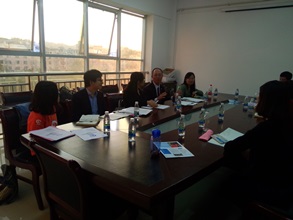
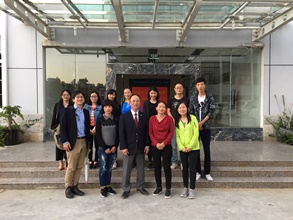
In China, the healthcare services available for mothers and children can differ significantly by region. In rural areas, there is a strong need to improve the skills of healthcare professionals through IMCI training. It is also necessary to help local residents become more adept at addressing childhood illnesses. One year has passed since the start of this project. Through our visit to Mabi Village, we were able to confirm that healthcare education activities were effectively being conducted at the community center. Going forward, we hope to help parents become more capable of quickly detecting the signs of childhood illness and responding appropriately. We will therefore continue to track the progress of this project in order to facilitate smooth medical coordination between village doctors (healthcare offices) and township and county hospitals.
This project is focused on contributing to the accomplishment of “Goal 3: Ensure healthy lives and promote well-being for all at all ages” of the Sustainable Development Goals, a set of goals adopted by member states of the United Nations in relation to issues needing to be addressed on a global scale. Accordingly, we are receiving support from the non-governmental organization Plan International Japan, a member of Plan International, in advancing this project.
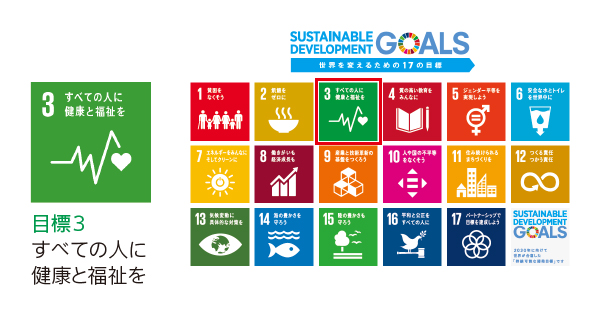
Photograph provided by Plan International Japan